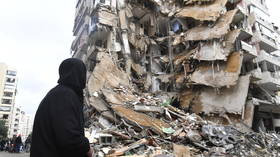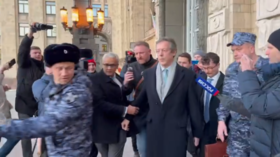Russia comments on US ‘religious freedom’ claims

Russia isn't cracking down on religious minorities, and claims to the contrary are part of a concerted smear campaign by the US, a senior Moscow diplomat has insisted after Washington added the country to a rights blacklist.
“The Americans’ categorical statement on ‘egregious violations of religious freedom’ is outrageous,” Ambassador-at-Large of the Russian Foreign Ministry Gennady Askaldovich told journalists on Monday. “We must repeat again and again that there is no religious persecution in Russia. There is no one who could be considered a ‘prisoner of conscience’ even at a stretch. I remind you, that in the Russian justice system punishment is decided based on facts and on the severity of the misdemeanor and crime.”
The diplomat’s comments come after US Secretary of State Antony Blinken included Russia on a list of countries that Washington believes violate freedoms of believers. “Certainly, this typical American attack, which fits in a series of other unfriendly actions by the US in relation to our country, will not go unnoticed,” Askaldovich went on.
“We will expose the Americans’ desire to use the religious factor for the realization of their global ambitions. This example of crude American pressure is not our way,” he blasted.
Earlier this month, Blinken announced ten countries Washington claims are “engaged in or tolerated systematic, ongoing, egregious violations of religious freedom." In addition to Russia, the list included China, Myanmar, North Korea, Saudi Arabia, Iran, Eritrea, Tajikistan, Turkmenistan and Pakistan. Nigeria, which had been on the list last year, was removed.
“In far too many places around the world, we continue to see governments harass, arrest, threaten, jail, and kill individuals simply for seeking to live their lives in accordance with their beliefs,” Blinken said at the time.
Moscow maintains that the US is politicizing the religious sphere and using ‘human rights’ as a pretext for sanctions. “Have the steps taken by the Americans, their dictate and their political pressure, led to any positive results?” asked Askaldovich. “If I’m not mistaken, there are no examples in the history of international relations. It is an inertial approach, driving a situation that requires delicacy, tact, and restraint into a dead end.”
The most common religion in Russia is Orthodox Christianity, which, according to a 2017 Pew Forum survey, around 70% of people say is their faith, while the country has one of the largest Muslim minorities in the world. Moscow has, however, come under fire from international groups for effectively outlawing Jehovah’s Witnesses as a religious organization. The group was termed ‘extremist’ in 2017 by the Russian Supreme Court over beliefs and activities that officials say are harmful to society. Those breaching the ruling face arrest and prosecution.
However, earlier this month, the Supreme Court banned the criminal prosecution of Jehovah’s Witnesses for worshiping together. The justices said that joint prayers among members of banned religious organizations “consisting exclusively in the exercise of their right to freedom of conscience and freedom of religion, including through individual or joint profession of religion…do not contain elements of extremism.”














